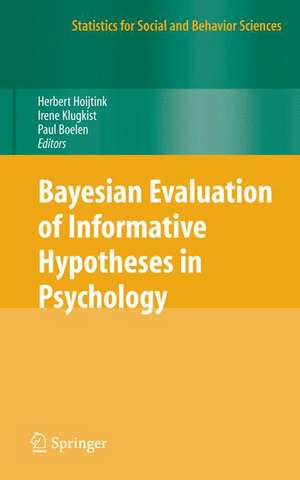Bayesian Evaluation of Informative Hypotheses: Statistics for Social and Behavioral Sciences
Editat de Herbert Hoijtink, Irene Klugkist, Paul Boelenen Limba Engleză Hardback – 6 oct 2008
| Toate formatele și edițiile | Preț | Express |
|---|---|---|
| Paperback (1) | 700.75 lei 6-8 săpt. | |
| Springer – 25 noi 2010 | 700.75 lei 6-8 săpt. | |
| Hardback (1) | 648.24 lei 6-8 săpt. | |
| Springer – 6 oct 2008 | 648.24 lei 6-8 săpt. |
Din seria Statistics for Social and Behavioral Sciences
-
 Preț: 361.83 lei
Preț: 361.83 lei - 18%
 Preț: 884.35 lei
Preț: 884.35 lei - 20%
 Preț: 696.30 lei
Preț: 696.30 lei - 15%
 Preț: 586.38 lei
Preț: 586.38 lei -
 Preț: 393.13 lei
Preț: 393.13 lei - 18%
 Preț: 896.70 lei
Preț: 896.70 lei - 18%
 Preț: 904.11 lei
Preț: 904.11 lei - 18%
 Preț: 811.61 lei
Preț: 811.61 lei - 18%
 Preț: 782.10 lei
Preț: 782.10 lei - 15%
 Preț: 649.54 lei
Preț: 649.54 lei - 23%
 Preț: 788.31 lei
Preț: 788.31 lei -
 Preț: 390.46 lei
Preț: 390.46 lei - 15%
 Preț: 650.04 lei
Preț: 650.04 lei - 18%
 Preț: 806.87 lei
Preț: 806.87 lei - 18%
 Preț: 952.26 lei
Preț: 952.26 lei - 18%
 Preț: 1126.52 lei
Preț: 1126.52 lei - 18%
 Preț: 1005.11 lei
Preț: 1005.11 lei - 18%
 Preț: 1219.94 lei
Preț: 1219.94 lei - 18%
 Preț: 897.65 lei
Preț: 897.65 lei - 15%
 Preț: 588.37 lei
Preț: 588.37 lei - 15%
 Preț: 644.30 lei
Preț: 644.30 lei - 18%
 Preț: 730.97 lei
Preț: 730.97 lei -
 Preț: 381.21 lei
Preț: 381.21 lei - 15%
 Preț: 638.43 lei
Preț: 638.43 lei - 18%
 Preț: 1228.47 lei
Preț: 1228.47 lei -
 Preț: 386.81 lei
Preț: 386.81 lei - 15%
 Preț: 639.73 lei
Preț: 639.73 lei -
 Preț: 381.00 lei
Preț: 381.00 lei - 18%
 Preț: 1223.74 lei
Preț: 1223.74 lei -
 Preț: 385.25 lei
Preț: 385.25 lei - 15%
 Preț: 702.87 lei
Preț: 702.87 lei -
 Preț: 383.33 lei
Preț: 383.33 lei - 18%
 Preț: 1228.47 lei
Preț: 1228.47 lei -
 Preț: 390.25 lei
Preț: 390.25 lei
Preț: 648.24 lei
Preț vechi: 762.64 lei
-15% Nou
Puncte Express: 972
Preț estimativ în valută:
124.04€ • 129.51$ • 102.66£
124.04€ • 129.51$ • 102.66£
Carte tipărită la comandă
Livrare economică 05-19 aprilie
Preluare comenzi: 021 569.72.76
Specificații
ISBN-13: 9780387096117
ISBN-10: 0387096116
Pagini: 361
Ilustrații: XII, 361 p.
Dimensiuni: 155 x 235 x 23 mm
Greutate: 0.64 kg
Ediția:2008
Editura: Springer
Colecția Springer
Seria Statistics for Social and Behavioral Sciences
Locul publicării:New York, NY, United States
ISBN-10: 0387096116
Pagini: 361
Ilustrații: XII, 361 p.
Dimensiuni: 155 x 235 x 23 mm
Greutate: 0.64 kg
Ediția:2008
Editura: Springer
Colecția Springer
Seria Statistics for Social and Behavioral Sciences
Locul publicării:New York, NY, United States
Public țintă
ResearchCuprins
An Introduction to Bayesian Evaluation of Informative Hypotheses.- An Introduction to Bayesian Evaluation of Informative Hypotheses.- Bayesian Evaluation of Informative Hypotheses.- Illustrative Psychological Data and Hypotheses for Bayesian Inequality Constrained Analysis of Variance.- Bayesian Estimation for Inequality Constrained Analysis of Variance.- Encompassing Prior Based Model Selection for Inequality Constrained Analysis of Variance.- An Evaluation of Bayesian Inequality Constrained Analysis of Variance.- A Further Study of Prior Distributions and the Bayes Factor.- Bayes Factors Based on Test Statistics Under Order Restrictions.- Objective Bayes Factors for Informative Hypotheses: “Completing” the Informative Hypothesis and “Splitting” the Bayes Factors.- The Bayes Factor Versus Other Model Selection Criteria for the Selection of Constrained Models.- Bayesian Versus Frequentist Inference.- Beyond Analysis of Variance.- Inequality Constrained Analysis of Covariance.- Inequality Constrained Latent Class Models.- Inequality Constrained Contingency Table Analysis.- Inequality Constrained Multilevel Models.- Evaluations.- A Psychologist’s View on Bayesian Evaluation of Informative Hypotheses.- A Statistician’s View on Bayesian Evaluation of Informative Hypotheses.- A Philosopher’s View on Bayesian Evaluation of Informative Hypotheses.
Recenzii
From the reviews:
“While this book is a collection of papers, the editors have done a great service to the reader by choosing three substantial psychology research studies that are used as examples throughout the book. The continuity of examples provides easy comparison among the methods and makes subsequent developments easier to follow. The book identifies open questions…and provides alternative methodologies with discussion. Each chapter provides a comprehensive bibliography, which makes this book an excellent reference. Statisticians and quantitative social scientists who are interested in a broad introduction and review of Bayesian methods for informative hypotheses, including several chapters of detailed statistical development, will find this book valuable.” (Journal of the American Statistical Association, Mar. 2010, Vol. 105, No.489)
“…Bayesian evaluation for informative hypotheses was first proposed by Hoijtink (2001). The present book collects the recent developments in the area… since then. The content…is the result of written contributions from the workshop in Utrecht in June 2007. …The book is well written … software accompanying the main topics... are available on the website. …This book is motivated largely by a number of examples in psychological and social science, resulting in the particular interest to the researchers in these fields. However researchers in other disciplines such as public health and biomedical science may find this book useful since similar questions of informative hypotheses are encountered frequently in those fields as well. The book succeeds in its aims and is undoubtedly a valuable resource for the public. I would recommend the book to psychologists and scientists in the aforementioned areas who wish to do more complicated analyses. I would also recommend this book to biostatisticians and statisticians who are keen to expand their horizons orwant to attain some inspiration… .” (Biometrics 65, 1308–1309, December 2009)
"This book has been very imaginatively planned and anchored around analysis of challenging problems of (Clinical) Psychology. Not only the analyses but the design of experiments and the variables measured are very interesting. ... This is an excellent book for psychologists and Bayesian statisticians. Strongly recommended for both categories of readers." (International Statistical Review 2009, 77, 2)
“The methods developed here are applicable in areas other than ANOVA, such as ANCOVA, latent class models, and contingency tables. … For those who find ANOVA troubling … and are not so devoted to frequentist approaches as to be troubled by the use of priors (informative or not), this book provides a way forward. If you fall into this class of readers, I highly recommend that you read this book and, when appropriate, consider using the methods described therein in your own work.” (Lawrence Barker, Technometrics, Vol. 52 (3), August, 2010)
“While this book is a collection of papers, the editors have done a great service to the reader by choosing three substantial psychology research studies that are used as examples throughout the book. The continuity of examples provides easy comparison among the methods and makes subsequent developments easier to follow. The book identifies open questions…and provides alternative methodologies with discussion. Each chapter provides a comprehensive bibliography, which makes this book an excellent reference. Statisticians and quantitative social scientists who are interested in a broad introduction and review of Bayesian methods for informative hypotheses, including several chapters of detailed statistical development, will find this book valuable.” (Journal of the American Statistical Association, Mar. 2010, Vol. 105, No.489)
“…Bayesian evaluation for informative hypotheses was first proposed by Hoijtink (2001). The present book collects the recent developments in the area… since then. The content…is the result of written contributions from the workshop in Utrecht in June 2007. …The book is well written … software accompanying the main topics... are available on the website. …This book is motivated largely by a number of examples in psychological and social science, resulting in the particular interest to the researchers in these fields. However researchers in other disciplines such as public health and biomedical science may find this book useful since similar questions of informative hypotheses are encountered frequently in those fields as well. The book succeeds in its aims and is undoubtedly a valuable resource for the public. I would recommend the book to psychologists and scientists in the aforementioned areas who wish to do more complicated analyses. I would also recommend this book to biostatisticians and statisticians who are keen to expand their horizons orwant to attain some inspiration… .” (Biometrics 65, 1308–1309, December 2009)
"This book has been very imaginatively planned and anchored around analysis of challenging problems of (Clinical) Psychology. Not only the analyses but the design of experiments and the variables measured are very interesting. ... This is an excellent book for psychologists and Bayesian statisticians. Strongly recommended for both categories of readers." (International Statistical Review 2009, 77, 2)
“The methods developed here are applicable in areas other than ANOVA, such as ANCOVA, latent class models, and contingency tables. … For those who find ANOVA troubling … and are not so devoted to frequentist approaches as to be troubled by the use of priors (informative or not), this book provides a way forward. If you fall into this class of readers, I highly recommend that you read this book and, when appropriate, consider using the methods described therein in your own work.” (Lawrence Barker, Technometrics, Vol. 52 (3), August, 2010)
Textul de pe ultima copertă
This book presents an alternative for traditional null hypothesis testing. It builds on the idea that researchers usually have more informative research-questions than the "nothing is going on" null hypothesis, or the "something is going on" alternative hypothesis. To be more precise, researchers often express their expectations in terms of expected orderings in parameters, for instance, in group means. This book introduces a novel approach, wherein theories or expectations of empirical researchers are translated into one or more so-called informative hypotheses, i.e., hypotheses imposing inequality constraints on (some of) the model parameters. As a consequence, informative hypotheses are much closer to the actual questions researchers have and therefore make optimal use of the data to provide more informative answers to these questions.
A Bayesian approach is used for the evaluation of informative hypotheses and is introduced at a non-technical level in the context of analysis of variance models. Technical aspects of Bayesian evaluation of informative hypotheses are also considered and different approaches are presented by an international group of Bayesian statisticians. Furthermore, applications in a variety of statistical models including among others latent class analysis and multi-level modeling are presented, again at a non-technical level. Finally, the proposed method is evaluated from a psychological, statistical and philosophical point of view.
This book contains numerous illustrations, all in the context of psychology. The proposed methodology, however, is equally relevant for research in other social sciences (e.g., sociology or educational sciences), as well as in other disciplines (e.g., medical or economical research).
The editors are all affiliated at the faculty of Social Sciences at Utrecht University in the Netherlands. Herbert Hoijtink is a professor in applied Bayesian statistics at the Department of Methodology and Statistics. Irene Klugkist is assistant professor at the same department, and Paul A. Boelen is assistant professor at the Department of Clinical and Health Psychology.
A Bayesian approach is used for the evaluation of informative hypotheses and is introduced at a non-technical level in the context of analysis of variance models. Technical aspects of Bayesian evaluation of informative hypotheses are also considered and different approaches are presented by an international group of Bayesian statisticians. Furthermore, applications in a variety of statistical models including among others latent class analysis and multi-level modeling are presented, again at a non-technical level. Finally, the proposed method is evaluated from a psychological, statistical and philosophical point of view.
This book contains numerous illustrations, all in the context of psychology. The proposed methodology, however, is equally relevant for research in other social sciences (e.g., sociology or educational sciences), as well as in other disciplines (e.g., medical or economical research).
The editors are all affiliated at the faculty of Social Sciences at Utrecht University in the Netherlands. Herbert Hoijtink is a professor in applied Bayesian statistics at the Department of Methodology and Statistics. Irene Klugkist is assistant professor at the same department, and Paul A. Boelen is assistant professor at the Department of Clinical and Health Psychology.
Caracteristici
This book provides a step-by-step explanation aimed mainly at social scientists, of how to formulate and evaluate a set of informative hypotheses (including references to software). It is a comprehensive book that can easily be accessed by social scientists introducing and elaborating the approach from a philosophical, statistical and psychological point of view.
















